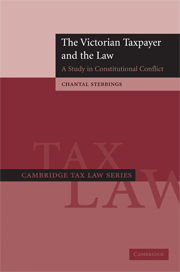Book contents
- Frontmatter
- Contents
- Acknowledgements
- Table of Statutes
- Table of Cases
- List of Abbreviations
- 1 The establishment of the taxpayer's safeguards in English law
- 2 The taxpayer's constitutional safeguards of Parliament
- 3 The administrative safeguard of localism
- 4 Judicial safeguards
- 5 The taxpayer's access to the safeguards
- 6 The taxpayer, the constitution and consent
- Index
6 - The taxpayer, the constitution and consent
Published online by Cambridge University Press: 08 August 2009
- Frontmatter
- Contents
- Acknowledgements
- Table of Statutes
- Table of Cases
- List of Abbreviations
- 1 The establishment of the taxpayer's safeguards in English law
- 2 The taxpayer's constitutional safeguards of Parliament
- 3 The administrative safeguard of localism
- 4 Judicial safeguards
- 5 The taxpayer's access to the safeguards
- 6 The taxpayer, the constitution and consent
- Index
Summary
The Victorian taxpayer's protection under the law
A number of factors combined to force a re-evaluation of the traditional relationship between the taxpayer and the law in the nineteenth century. These included changes in fiscal policy and culture, shifting ideologies, rapidly increasing national wealth, the sophistication of commerce and industry and the pragmatic and political demands arising from these. English law had always recognised the inequality inherent in the relationship between the state and the taxpayer, and had made provision to place them, as far as possible, on an equal footing before it to ensure the taxpayer was not subjected to any illegal exaction. This it did by giving extra, and special, protection to the taxpayer as such, and that protection lay primarily in founding the legal right to impose taxes in the taxpayer's own consent and the legal authority to administer them in the hands of his or her own representatives. It has been seen that by the start of the Great War in 1914, when the world took on a greater fight to defend its fundamental freedoms, the three safeguards constructed by the law and for the maintenance of which the civil war of the seventeenth century had in part been fought, had been significantly undermined. They had been revealed as outdated and restrictive, pragmatically if not ideologically, unacceptably impeding the efficient collection of the public revenue and the implementation of its wider policies, which central government demanded.
- Type
- Chapter
- Information
- The Victorian Taxpayer and the LawA Study in Constitutional Conflict, pp. 177 - 222Publisher: Cambridge University PressPrint publication year: 2009



